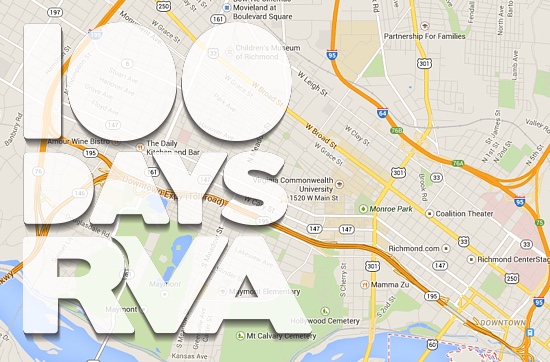Day #081: Using smartphones to tell the stories of Richmond
How can we better share the history and stories of Richmond using smart phones?

Inspired by Michael Bierut’s 100 Day Project, 100 Days to a Better RVA strives to introduce and investigate unique ideas to improving the city of Richmond. View the entire project here and the intro here.
- Idea: A hyperlocal app that geographically organizes data for residents and tourists.
- Difficulty: 3 — Reaching a critical mass of users could take time, and legal worries are always a concern.
In the 1990s, Microsoft Encarta looked like the future of online encyclopedias. With the Encyclopedia Brittanica struggling to adapt to the internet, Encarta was poised to dominate for decades. In 2001, a small internet non-profit named after a shuttle at the Honolulu airport launched; Wikipedia is now the world’s sixth most visited website while Encarta didn’t survive 2009. Internet guided walking tours and infomaps are stuck in the age of Encarta. It’s time to develop a better way of matching information with geography in Richmond using smartphones.
Outside of pure navigation and transportation, smartphones haven’t had a significant impact on the way humans engage with streets. History and storytelling have been confined to clunky and limited for-profit apps. City Maps and Walks, one of the most popular apps of this style, has narrow content, is really only relevant to visitors of Richmond, and it is not particularly engaging.
Richmond is a city worthy of a platform that shares a large amount of history and stories in a way that’s engaging to first time visitors and longtime residents alike.
In the beginning, the app could be a simple map with icons connected to the geocodes of relevant Wikipedia articles.1 Much of the content on City Maps and Walks is taken directly from Wikipedia, but it is only accessible through attraction names. The opposite, a map that contains all of the stories would foster exploration while encouraging interactions with some of the lesser-known spaces in Richmond.
If successful, a self-regulating community could develop, much like that of Wikipedia. The top level of information, which would be aimed at tourists like the tsunami of cycling fans headed to Richmond2015, would be held to a higher level of scrutiny by volunteer editors or a sponsoring agency. The Virginia Historical Society or Library of Virginia have the knowledge and resources to be successful, but it could also develop organically. Digital “tours” could be curated by residents of Richmond instead of a for-profit company in some other town aggregating content at a rapid pace. The platform could encourage all types of media including photos, videos, audio recordings, tweets, and much more.
Below the surface, a platform for much broader storytelling and history could add another layer to our lives while breaking down barriers between the real and digital worlds. For years I’ve heard stories about GWAR living in the apartment above Aladdin’s Express on Broad Street. In addition to corroborating some of those stories, which are a part of Richmond lore, a digital destination with stories and links about the Slave Pit would be both useful and entertaining.2
What if every property in Richmond had an article? It would be particularly fascinating in the Fan where information from the more than one hundred years of history would accumulate over time. Privacy would be a concern, so the system would need to rely on self-policing. There’s so much information on the internet, how we order new information for future access is of utmost importance. Maybe RVANews should start geocoding every story?
The internet has enabled the centralization of many industries while also creating a tool for hyper-local content and collaboration. Richmond is an incredible city with fascinating residents and stories. Those stories deserved to be documented and packaged for the enjoyment of visitors and residents while documenting the living history of this town for the future.
Love this idea? Think it’s terrible? Have one that’s ten times better? Head over to the 100 Days to a Better RVA Facebook page and join in the conversation.
- Google Maps did this before Google shut down the Wikipedia overlay in 2013. ↩
- It would also help Richmond embrace its non-Civil War history. ↩
-
Recommend this
on Facebook -

Report an error
-

Subscribe to our
Weekly Digest





There are no reader comments. Add yours.